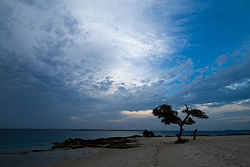Nacala, also known as Cidade de Nacala or Nacala-Porto is a city on the northern coast of Mozambique. Located in the southwestern indentation of inner Fernao Veloso Bay, it is the deepest natural port on the east coast of Africa. Nacala serves as the terminal for the Nacala railway, a rail line to the landlocked Malawi. South of Nacala is Mozambique Island, at one time the capital of Mozambique and now a World Heritage Site.
Nacala
Maiaia Cidade de Nacala | |
|---|---|
 The beach at Nacala | |
| Nickname: Nacala-Porto | |
| Coordinates: 14°27′S 40°40′E / 14.450°S 40.667°E | |
| Country | |
| Provinces | Nampula Province |
| District | Nacala-porto |
| Government | |
| • Type | Democratico |
| • Presidente do Municipio | Raul Novinte |
| Population (2017 census) | |
| • Total | 225,034 |
| Climate | Aw |
| Website | https://www.facebook.com/CMCNacalaPorto |
History
editNacala was founded as a little town and developed as a deep waters port and an industrial, agricultural and exporting centre during the last period of the Portuguese rule of the territory which ended in the mid-1970s. Among its major industries were cement, sisal and cashew. Other important employers were the seaport, its small modern hospital, and services (banking, insurance and administration).[1]
Industry
editNacala is site of one of three cement works in Mozambique.
Transport
editNacala is the terminal of the Nacala railway that connects to the Central East African Railway (CEAR) of Malawi. The railway system was managed by the Railroad Development Corporation until September 2008 when it was sold to a group of Mozambican investors.[2]
It is the location of the deep water port of Port of Nacala. A coal terminal, operated by the Port of Nacala, is located in the town of Nacala-a-Velha on the opposite side of the bay from Nacala.
Nacala Airport is a former airbase that has been converted into an international airport.
Demographics
edit| Year (census) | Population[3] |
|---|---|
| 1997 | 158,248 |
| 2007 | 206,449 |
| 2017 | 225,034 |
Climate
edit| Climate data for Nacala | |||||||||||||
|---|---|---|---|---|---|---|---|---|---|---|---|---|---|
| Month | Jan | Feb | Mar | Apr | May | Jun | Jul | Aug | Sep | Oct | Nov | Dec | Year |
| Mean daily maximum °C (°F) | 32 (89) |
32 (89) |
32 (89) |
32 (89) |
31 (88) |
30 (86) |
29 (85) |
30 (86) |
31 (87) |
32 (89) |
32 (89) |
32 (89) |
31 (88) |
| Mean daily minimum °C (°F) | 19 (67) |
19 (67) |
19 (67) |
18 (65) |
17 (63) |
16 (61) |
16 (60) |
15 (59) |
16 (61) |
18 (64) |
18 (65) |
19 (66) |
18 (64) |
| Average precipitation mm (inches) | 190 (7.6) |
190 (7.6) |
170 (6.7) |
56 (2.2) |
13 (0.5) |
10 (0.4) |
2.5 (0.1) |
7.6 (0.3) |
5.1 (0.2) |
5.1 (0.2) |
33 (1.3) |
120 (4.8) |
810 (31.8) |
| Source: Weatherbase [4] | |||||||||||||
Miscellaneous
editThe town is also known for its beaches and scuba diving.
Namesake
editThere is another town in Mozambique that contains the name Nacala, it is called Nacala-a-Velha ("The Old Nacala"), just across the bay (c. 30km by road).
See also
editReferences
edit- ^ Nacala - no outro lado do tempo, short film of Nacala, Portuguese Mozambique before independence in 1975.
- ^ RDC management
- ^ "Mozambique: largest cities and towns and statistics of their population". World Gazetteer. Retrieved 2008-06-18.[dead link]
- ^ "Weatherbase: Historical Weather for Nacala, Mozambique". Weatherbase. 2011. Retrieved on November 24, 2011.
